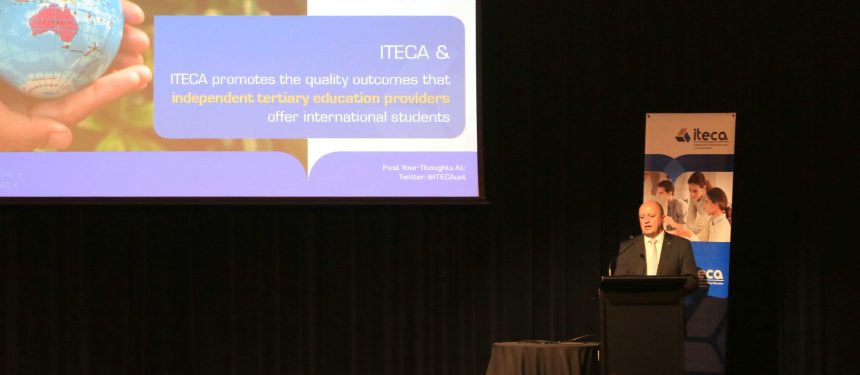The favourable conditions behind Australia’s growth in international education may soon evaporate, and educators should prepare for increased competition from other destinations and even traditional source markets, experts have warned at the Asia Pacific International Education Forum.
News and business analysis for Professionals in International Education
Have some pie!
Australian int’l education sector prepares for increased competition
 ITECA chief executive Troy Williams said private providers needed to collaborate with his organisation as it works with government. Photo: The PIE
ITECA chief executive Troy Williams said private providers needed to collaborate with his organisation as it works with government. Photo: The PIE Run by the Independent Tertiary Education Council Australia, the forum highlighted the changing needs of international students as well as the improved offerings of other markets as a signal for a potential dip for Australia’s international enrolments.
“We’ve seen change, we’ve seen volatility”
“We live in rapidly changing and complex environments,” said ITECA chair Alexis Watt.
“In Australia, we do have and have had for a long time, an excellent tertiary education system. It’s highly regarded internationally, but it’s insufficient for us to rest on that history.”
Speaking at the opening of the conference, Watt added private vocational and higher education providers had a responsibility to ensure international students and workers become global citizens.
“We’re faced with a challenge to change, to improve. We need to understand and respond to what those changes are.”
Among the challenges, increased competition from other sources markets were beginning to have an impact on Australia’s international education numbers.
Year-to-June 2019 figures, released at the end of August, show while international students numbers are up 12% from the same time the previous year, new enrolments only increased 9%, and overall Chinese commencements saw a mild decrease, particularly at within pathway levels such as ELICOS.
Rhett Miller, education trade commissioner Shanghai, said as countries such as Japan, India, Malaysia, and the UK implement their own international education strategies, Australia’s value proposition and brand were becoming harder to differentiate.
“All this competition is happening in what is most definitely an increasingly uncertain economic environment,” he said.
“We have the uncertainty in the global economy brought on by Brexit and the trade war, and I think most critically for us, the slowing of Chinese GDP growth to what is now its lowest point in 30 years.”
Miller added a new national brand was being developed to replace the Future Unlimited campaign and better differentiate Australia.
“We need to avoid a short-term approach, and we need to take the longer-term view and maintain investments in diversity markets even when it is tough to do so.
“We can’t cut and run, as I think we’ve sometimes done in certain markets.”
Brett Blacker, chief executive of English Australia, agreed with Miller’s points, saying that educators should be more concerned with external competition, over in-country provider-to-provider competition.
“What’s happening in terms of the landscape in the UK and the US, would have a much greater influence on our success in international education than other local activities,” he said, observing that the landscapes in both countries were likely to improve shortly.
Australia’s additional services offerings were no longer world leaders, Blacker added, pointing to examples such as New Zealand’s post-study work rights, which, unlike Australia, provide a year’s work for vocational graduates.
“It’s insufficient for us to rest on that history”
To prevent declines, ITECA chief executive Troy Williams called upon delegates to collaborate with his organisation as it works with government.
“We’re able to take this feedback to government and say we’re at a very early stage where we’re able to identify the trends and all of the things that are acting as an impediment to international education in Australia,” he said.
“That’s how we’re most effective when we take your advice and guidance and give it to the government.”
While delegates were told to prepare for a potential downturn, chief executive of Sarina Russo Institute, Kathleen Newcombe, called for level heads, saying that Australia’s international education sector had been resilient to change in the past.
“We’ve seen change, we’ve seen volatility, we’ve seen the power of private and public providers,” she said.
“This is an interesting time to be in the sector because there is a lot of change afoot, the headwinds, as I’ve heard lots of politicians in Canberra refer to them, are gusting at the moment.
“But we’re a resilient group, and we’re going to talk about how we deal with those challenges, how we address the address them, and how we go on to continue to grow.”
Still looking? Find by category:


